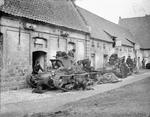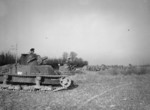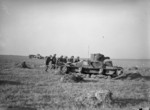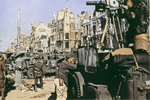21 Mar 1917
France
France
- British No. 100 Squadron RFC, the first RFC squadron specifically trained for night operations, moved from Hingham, Norfolk, England, United Kingdom (where it was formed) to Saint-André-aux-Bois in France. The unit's first aircraft were twelve F.E.2Bs. ww2dbase [Saint-André-aux-Bois, Nord-Pas-de-Calais | AC]
5 Apr 1917
France
France
- Overnight, the British No. 100 Squadron RFC, the first British purpose-trained night operations squadron, flew B.E.2E aircraft during its first operation with two raids on Douai airfield in France, at that time home to the notorious Manfred von Richtofen's Jasta 11 "Flying Circus". ww2dbase [Douai, Nord-Pas-de-Calais | AC]
7 May 1917
France
France
- British Captain Albert Ball VC, DFC & 2 Bars & MC, RFC (43 kills and one balloon) was killed when, in his SE.5a aircraft, he dived into cloud in pursuit of a German aircraft over Lens, France. He was buried by the Germans with full Military honours. ww2dbase [Lens, Nord-Pas-de-Calais | AC]
29 Oct 1939
France
France
- The body of Kapitänleutnant Dietrich von der Ropp, commanding officer of U-12, washed ashore near Dunkerque, France; the submarine was lost to a mine on 8 Oct 1939. ww2dbase [U-12 | Dunkerque, Nord-Pas-de-Calais | CPC]
18 May 1940
France
France
- Walter Grabmann, flying a Bf 110 heavy fighter, was shot down by British Hurricane fighters over Douai, France; he parachuted to safety but was captured. ww2dbase [Walter Grabmann | Douai, Nord-Pas-de-Calais | CPC]
21 May 1940
France
France
- The French destroyer L'Adroit (T23) was in company of two other destroyers when German He 111 bombers attacked. One aircraft hit her with a bomb that exploded just in front of the bridge. One third of the ship was ripped off and her commanding officer Captain Henri Dupin de Saint-Cyr beached her at Malo-les-Bains, Dunkerque, France at 0035 hours where she was on fire. As she had just been reloaded with ammunition and torpedoes for a mission on the Scheldt Estuary to the northeast, the entire crew abandoned ship, and locals of Malo-les-Bains were also evacuated. At 0230 hours the ship was destroyed by seven large explosions. ww2dbase [Invasion of France and the Low Countries | Dunkerque, Nord-Pas-de-Calais | HM]
22 May 1940
France
France
- In France, Theodor Eicke's SS Division Totenkopf, a police unit raised to provide concentration camp guards, murdered ninety-two civilians in the town of Aubigny-en-Artois and another forty-five in the villages of Vandélicourt and Berles-Monchel as they headed towards the canal line before Dunkerque. ww2dbase [Invasion of France and the Low Countries | Aubigny-en-Artois, Nord-Pas-de-Calais | AC]
24 May 1940
France
France
- British Lieutenant Christopher Furness, the son of Viscount Furness, was killed in hand to hand fighting near Arras, France after his Bren gun carrier group engaged a vastly superior enemy force in order to allow a convoy to escape. He was awarded a posthumous Victoria Cross. ww2dbase [Arras, Nord-Pas-de-Calais | AC]
- The Polish destroyer Burza was ordered to join the British destroyers HMS Vimiera (L 29) and HMS Wessex (D 43) and shell German positions in Calais area on the French coast. At 1620 hours the Allied vessels opened fire on a German armoured column at Sangatte Hill, west of Calais. Ten minutes later they were attacked by 27 German aircraft which hit and sank HMS Wessex about 5 miles off of the coast. HMS Vimiera managed to escape. Then the entire enemy air group concentrated on the Polish destroyer. The two 40-millimeter anti-aircraft guns jammed due to shrapnel hits. Three bombs exploded in the water and they caused boiler damage and loss of speed. The commanding officer, Lieutenant Commander Wojciech Francki, ordered to emergency launch the torpedoes and drop all depth charges, trying to avoid additional explosions. Shortly after this, two bombs hit the Burza and badly damaged her. However the airplanes had dropped all of their bombs and broke off the attack. The crew managed to stop the leakage and return to Dover, England, United Kingdom. One German airplane was shot down during the action. ww2dbase [Burza | Invasion of France and the Low Countries | Calais, Nord-Pas de Calais | HM]
25 May 1940
France
France
- Adolf Hitler continued to hold off his tanks from engaging on an offensive even though those armored division were merely 10 miles from Dunkerque, France. At Calais, France, Heinz Guderian obediently, albeit frustratingly, ordered his tanks to halt per Hitler's orders, but the field commanders continued to push back the British and French troops. In the evening, British Expeditionary Force commanding general Lord Gort began to fall back to Dunkerque. On the same day, the French Army relieved 15 generals of their commands. ww2dbase [Invasion of France and the Low Countries | Dunkerque, Nord-Pas-de-Calais | TH]
26 May 1940
France
France
- At Dunkerque, France, British Expeditionary Force commanding general Lord Gort received the formal authorization for a withdraw; Operation Dynamo, the code name of the massive evacuation, was headed by British Admiral Sir Bertram Ramsey. Meanwhile, Adolf Hitler rescinded the order to halt the offensive near Dunkerque. At Calais, after a heavy aerial and field artillery bombardment, German troops crossed the canals and moved toward the Citadel; at 1600 hours, Brigadier Claude Nicholson surrendered. Elsewhere, the French 1st Army was nearly encircled by the Germans, while the Belgians was pushed back to the Leie/Lys River. ww2dbase [Invasion of France and the Low Countries | Dunkerque, Nord-Pas-de-Calais | CPC]
29 May 1940
France
France
- The 393-ton former Royal Mail Steam Packet Company paddle steamer Gracie Fields, serving in the capacity of a minesweeper since 1939, was hit by a bomb on her second trip to Dunkerque, France. Eight of her crew died in the attack. The ship remained afloat and an effort to tow her back to Britain would be mounted. ww2dbase [Invasion of France and the Low Countries | Dunkerque, Nord-Pas-de-Calais | HM]
30 May 1940
France
France
- The 3,236-ton French steamship Monique Schiaffino was bombed and sunk by German aircraft on at Dunkerque, France. ww2dbase [Invasion of France and the Low Countries | Dunkerque, Nord-Pas-de-Calais | HM]
- The 393-ton former Royal Mail Steam Packet Company paddle steamer Gracie Fields, serving in the capacity of a minesweeper since 1939 and damaged off Dunkerque, France on the previous day, sank while under tow early in the morning. ww2dbase [Invasion of France and the Low Countries | Dunkerque, Nord-Pas-de-Calais | HM]
- The Devonia, a side paddle steamer that had previously been requisitioned by the British Admiralty, came under heavy artillery fire and bombs from Stuka dive bombers as she approached the embarkation jetty by the beaches at Dunkerque, France. The ship had to be abandoned and beached. Her wreckage is still to be found on the beach. ww2dbase [Invasion of France and the Low Countries | Dunkerque, Nord-Pas-de-Calais | HM]
31 May 1940
France
France
- Poor weather clouded over Dunkerque, France, giving the British a chance to bring in modern destroyers into the area to assist the evacuation with less fear of German air attacks; 68,014 (45,072 from harbor and 22,942 from beaches) were rescued on this date, including British Expeditionary Force commanding general Lord Gort. French destroyer Leopart and British destroyers HMS Express, HMS Icarus, HMS Keith, and HMS Winchelsea were damaged by German aerial bombing. German torpedo boats damaged French destroyers Sirocco and Cyclone; Sirocco was finished off by German aircraft, killing 59 crew and 600 troops. ww2dbase [Invasion of France and the Low Countries | Dunkerque, Nord-Pas-de-Calais | TH]
- Oliver Leese was evacuated from a beach near Dunkerque, France. ww2dbase [Oliver Leese | Dunkerque, Nord-Pas-de-Calais | CPC]
1 Jun 1940
France
France
- Under a heavy German air raid at Dunkerque, France, Sergeant George Benton, RAMC, was carrying wounded men on stretchers to a ship at the East Mole when a bomb blew a hole in the walkway. Unflinching, he calmly placed a stretcher over the gap and carried on with the evacuation of the wounded. ww2dbase [Dunkerque, Nord-Pas-de-Calais | AC]
18 Jul 1940
France
France
- 18 British Blenheim bombers, escorted by 24 fighters, attacked German barges at Boulogne-sur-Mer, France at 1900 hours. ww2dbase [Boulogne-sur-Mer, Nord-Pas-de-Calais | CPC]
10 Aug 1940
France
France
- Hans-Joachim Marseille was assigned to I. (Jagd) Lehrgeschwader 2 based in Marck on the northern coast of France. ww2dbase [Hans-Joachim Marseille | Marck, Nord-Pas-de-Calais | CPC]
11 Sep 1940
France
France
- Hans-Joachim Marseille scored his third kill when he shot down a British Hurricane fighter over the French coast at 1705 hours. His fighter received heavy damage and he was forced to crash land at Wissant, France. ww2dbase [Hans-Joachim Marseille | Wissant, Nord-Pas-de-Calais | CPC]
20 Feb 1941
France
France
- Hans-Joachim Marseille returned to his unit at Berck-sur-Mer, France after a period of rest at home. ww2dbase [Hans-Joachim Marseille | Berck-sur-Mer, Nord-Pas-de-Calais | CPC]
14 Jun 1941
France
France
- German Luftwaffe ace Oberfeldwebel Robert Menge was shot down and killed near Marquise, France by Squadron Leader James E. Rankin of No. 92 Squadron RAF. At the time of his death Menge had 18 kills to his credit. ww2dbase [Marquise, Nord-Pas-de-Calais | AC]
21 Jun 1941
France
France
- Douglas Bader shot down a German Bf 109E aircraft off Boulogne-sur-Mer, Pas-de-Calais, France. ww2dbase [Douglas Bader | Boulogne-sur-Mer, Nord-Pas-de-Calais | CPC]
10 Jul 1941
France
France
- Douglas Bader claimed one German Bf 109 aircraft over Bethune, Pas-de-Calais, France, and later shot down a Bf 109E aircraft over nearby Calais. ww2dbase [Douglas Bader | Bethune, Nord-Pas-de-Calais | CPC]
12 Jul 1941
France
France
- Douglas Bader shot down a German Bf 109 fighter and damaged three others over Pas-de-Calais, France. ww2dbase [Douglas Bader | Nord-Pas-de-Calais | CPC]
19 Aug 1941
France
France
- Replacement prosthetic leg for captured Douglas Bader was dropped by a British bomber over Saint-Omer, Pas-de-Calais, France with permission by German Luftwaffe leaders. After the delivery, the British bomber took the opportunity to surprise-attack a power station in occupied France (though the attack would fail to materialize due to weather). ww2dbase [Douglas Bader | Saint-Omer, Nord-Pas-de-Calais | CPC]
9 Oct 1941
France
France
- No. 601 Squadron RAF mounted a mission with four P-39 Airacobra aircraft, strafing German barges near Dunkerque, France. This was to be the final Airacobra mission with the RAF. ww2dbase [P-39 Airacobra | Dunkerque, Nord-Pas-de-Calais | CPC]
22 Apr 1942
France
France
- Canadian and British troops raided the beaches near Boulogne, France in Operation Abercrombie, which failed to capture any German prisoners for interrogation and failed to destroy searchlight equipment. ww2dbase [Boulogne-sur-Mer, Nord-Pas-de-Calais | CPC]
9 Feb 1943
France
France
- Coronel ran aground off Dunkerque, France. ww2dbase [Togo / Coronel | Dunkerque, Nord-Pas-de-Calais | CPC]
10 Feb 1943
France
France
- Coronel was freed after running aground off Dunkerque, France on the previous day. Dashing through the English Channel, she sailed past the British coastal guns at Dover, England, United Kingdom. ww2dbase [Togo / Coronel | Dunkerque, Nord-Pas-de-Calais | CPC]
24 Feb 1943
France
France
- Coronel arrived at Dunkerque, France. ww2dbase [Togo / Coronel | Dunkerque, Nord-Pas-de-Calais | CPC]
13 Jun 1943
France
France
- Robert Johnson scored his first kill, a German Fw 190 aircraft of 10 Staffel of JG 26, over Bergues, France. ww2dbase [Robert Johnson | Bergues, Nord-Pas-de-Calais | AC, CPC]
27 Aug 1943
France
France
- 187 B-17 aircraft of US 9th Air Force attacked the German V2 bunker Blockhaus d'Éperlecques near Watten in Nord-Pas-de-Calais, France, redering the site mostly inoperable. ww2dbase [V-Weapons Campaign | La Coupole | Wizernes, Nord-Pas-de-Calais | AC]
5 Nov 1943
France
France
- The RAF mounted its first raid on the V1 launch sites (codename "Noball") when B-25 Mitchell bombers from No. 2 Group attacked a facility at Mimoyecques near Calais, France. ww2dbase [Mimoyecques, Nord-Pas-de-Calais | AC]
4 Mar 1944
France
France
- A British photo-reconnaissance flight by a Spitfire aircraft revealed concrete mixing was being conducted under camouflage netting beside the railway near Wizernes in northern France, and it was later determined that the site might possibly be intended for the launching of a large rocket. ww2dbase [V-Weapons Campaign | La Coupole | Wizernes, Nord-Pas-de-Calais | AC]
16 Jun 1944
France
France
- Before dawn, 300 Lancaster bombers attacked Boulogne, France, sinking the minesweeper tenders Von der Gröben, Brommy, and Von der Lippe. Seven motor minesweepers and two patrol boats were sunk with others badly damaged. Combined with the raid on Le Havre on the previous night, the two raids caused much damage to the harbour facilities including fuel storage and loading equipment. ww2dbase [Normandy Campaign, Phase 1 | Boulogne, Nord-Pas-de-Calais | HM]
18 Jun 1944
France
France
- British No. 617 Squadron attacked the 20-foot thick concrete dome containing V-2 rockets at Wizernes, France without success. They would return to this target on multiple occasions in the following month. ww2dbase [Vergeltungswaffe 2 | La Coupole | V-Weapons Campaign | Bombing of Cities in France and Low Countries | Wizernes, Nord-Pas-de-Calais | AC]
24 Jun 1944
France
France
- British No. 617 Squadron attacked the 20-foot thick concrete dome containing V-2 rockets at Wizernes, France with "Tallboy" bombs. The bombs caused extensive damage to buildings, roads and railway lines. ww2dbase [Vergeltungswaffe 2 | La Coupole | Bombing of Cities in France and Low Countries | V-Weapons Campaign | Wizernes, Nord-Pas-de-Calais | AC]
25 Jun 1944
France
France
- British No. 617 Squadron attacked the German V-2 store at Siracourt, France with 17 Lancaster, two Mosquito, and a Mustang (a gift from the USAAF) aircraft; the Mustang fighter was flown by Leonard Cheshire and used as a low-level marker aircraft. ww2dbase [Bombing of Cities in France and Low Countries | Vergeltungswaffe 2 | V-Weapons Campaign | Siracourt, Nord-Pas-de-Calais | AC]
6 Jul 1944
France

France
- Wing Commamner Leonard Cheshire led a "Tallboy" attack on the V-3 gun structure at Mimoyecque. After this mission, the last of his fourth tour, he was ordered to rest (he never flew operations again) and two months later he was awarded the Victoria Cross. ww2dbase [Bombing of Cities in France and Low Countries | Mimoyecque, Nord-Pas-de-Calais | AC]

17 Jul 1944
France
France
- Bombers of British No. 617 Squadron attacked the German V2 rocket site at Wizernes, France. ww2dbase [V-Weapons Campaign | La Coupole | Wizernes, Nord-Pas-de-Calais | AC]
20 Jul 1944
France
France
- Bombers of British No. 617 Squadron attacked the German V2 rocket site at Wizernes, France. ww2dbase [V-Weapons Campaign | La Coupole | Wizernes, Nord-Pas-de-Calais | AC]
2 Sep 1944
France
France
- Edward Brooks personally led an attack on a 165-vehicle German convoy near Marchiennes, France; this action would earn him the Oak Leaf Cluster to his Silver Star medal. ww2dbase [Edward Brooks | Marchiennes, Nord-Pas-de-Calais | CPC]
17 Sep 1944
France
France
- The siege of Boulogne, Pas-de-Calais, France began. With 1 Corps grounded from lack of transport, the only available formation was 3rd Canadian Division, less one brigade, but reinforced with some armour and medium regiments of artillery. Despite being smaller than Le Havre, Boulogne proved to be a hard nut to crack, with deep underground fortifications, as well as surrounding forts, minefields and anti-tank ditches. Heavy bombing on the opening day failed to destroy the many German gun batteries, making the siege more difficult than expected. ww2dbase [Normandy Campaign, Phase 2 | Boulogne, Nord-Pas-de-Calais | AC]
22 Sep 1944
France
France
- The German garrison in Boulogne, France surrendered to Canadian troops. ww2dbase [Boulogne, Nord-Pas-de-Calais | TH]
23 Sep 1944
France
France
- After a six-day siege, Canadian troops forced the German troops at Boulogne, Pas-de-Calais, France to surrender. The Canadians suffered 634 casualties and captured 9,500 prisoners (many driven from their bunkers by driving flame down the ventilation shafts). ww2dbase [Normandy Campaign, Phase 2 | Boulogne, Nord-Pas-de-Calais | AC]
25 Sep 1944
France
France
- Having taken Boulogne, France, Canadian 3rd Division assaulted Calais where their operation to capture the port would be complicated by the presence of 20,000 French civilians who have not been evacuated. ww2dbase [Calais, Nord-Pas de Calais | TH, AC]
1 Oct 1944
France
France
- The German garrison at Calais, France capitulated. The 3rd Canadian Division had suffered just 300 casualties in the siege of the town but had captured 7,500 Germans bringing their toll of prisoners taken in clearing the Channel ports to almost 30,000. Wreckage to the dock facilities were however extensive and the port would not be available for shipping until Nov 1944. ww2dbase [Normandy Campaign, Phase 2 | Calais, Nord-Pas-de-Calais | AC]
12 Oct 1944
France
France
- The docks at Boulogne, France were reopened, thus helping the Allied supply crisis to the armies north of the Seine River, which up to now had been reliant on Dieppe and Ostend whose combined capacity was only about 10,000 tons daily. ww2dbase [Boulogne-sur-Mer, Nord-Pas de Calais | AC]
28 Apr 1945
France
France
- Type XXVIIB5 Seehund submarines were used to supply food to the German garrison at Dunkerque, France. ww2dbase [Type XXVII | Dunkerque, Nord-Pas-de-Calais | CPC]
2 May 1945
France
France
- Type XXVIIB5 Seehund submarines were used to supply food to the German garrison at Dunkerque, France. ww2dbase [Type XXVII | Dunkerque, Nord-Pas-de-Calais | CPC]
10 May 1945
France
France
- The German garrison in Dunkerque, France surrendered to a Czechoslovak armoured brigade, two days after the surrender of the main German army in its homeland. ww2dbase [Germany's Surrender | Dunkerque, Nord-Pas-de-Calais | AC]
Please consider supporting us on Patreon. Even $1 per month will go a long way! Thank you. Please help us spread the word: Stay updated with WW2DB: |
Search WW2DB

News
- » Wreck of Teruzuki Found (27 Jul 2025)
- » USS Orlean's Bow Found (22 Jul 2025)
- » The Emperor of Japan Planned to Honor WW2-era Japanese POWs in Mongolia (4 Jul 2025)
- » US State Lawmaker John Winter Caught Using Racial Slur "Jap" and Apologized (11 Jun 2025)
- » US Government Plans to Purge WW2 Information (17 Mar 2025)
- » See all news
Random Photograph
Damaged Bre.19 aircraft which Boleslaw Orlinski and Leon Kubiak used to fly from Warsaw, Poland to Tokyo, Japan, 1926Current Site Statistics
- » 1,182 biographies
- » 337 events
- » 45,119 timeline entries
- » 1,248 ships
- » 350 aircraft models
- » 207 vehicle models
- » 376 weapon models
- » 123 historical documents
- » 261 facilities
- » 470 book reviews
- » 28,410 photos
- » 365 maps
Famous WW2 Quote
"No bastard ever won a war by dying for his country. You win the war by making the other poor dumb bastard die for his country!"George Patton, 31 May 1944
Support Us
Please consider supporting us on Patreon. Even $1 a month will go a long way. Thank you!
Or, please support us by purchasing some WW2DB merchandise at TeeSpring, Thank you!





